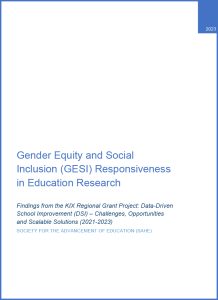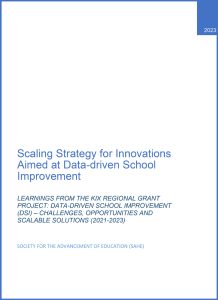Data-Driven School Improvement – Opportunities, Challenges, and Scalable Solutions
(International Development Research Centre (IDRC) 2021-2023

Research aimed at improving the quality of education in Pakistan, especially in public sector schools, is one of SAHE’s key areas of interest. As part of our efforts in this area, SAHE is working on a research project called Data Driven School Improvement (DSI) – Opportunities, Challenges, and Scalable Solutions. This project has been awarded to SAHE by the International Development and Research Centre (IDRC) working with the Global Partnership for Education (GPE) under its Knowledge and Innovation Exchange (GPE-KIX) Programme, led by the Brookings Institution’s Center for Universal Education (CUE).
As a joint endeavor between GPE and IDRC, the goal of KIX is to strengthen national education systems and accelerate educational progress in the Global South. This is being done by filling knowledge gaps, increasing access to evidence, and strengthening systems to the generation and uptake of evidence and innovations by GPE member countries.
Our project, DSI, has been designed to respond to the challenge of optimizing the use of Education Management Information Systems (EMIS), and it will address a key question: how can countries adapt and scale EMIS-led innovations that optimize the use of education data? The School Improvement Framework (SIF), piloted in Punjab and implemented in Khyber Pakhtunkhwa has been focused on in the project as a promising school-centric innovation that aids better organization, interpretation, and integration of EMIS data.
To address the question of adapting and scaling EMIS-led innovation, SAHE is working to develop a grounded theory of scalability along with participants from three countries, Nepal, US and Laos. In the process the project will provide us with a valuable opportunity to join a global community of researchers and practitioners working to address shared policy challenges in education in diverse contexts.
Project Team Lead: Dr Amna Ansari ([email protected])
Can the Education Information Management Systems in Pakistan help improve our schools?
Irfan Muzaffar
In developing nations, including Pakistan, Education Management Information Systems (EMISs) are primarily used for reporting rather than driving improvement in the education sector. As a result, schools, which are crucial sources of information and action, remain unseen in the aggregated statistics presented in EMIS reports. This policy challenge is prevalent in multiple countries, including those partnered with the Global Partnership for Education (GPE), especially in the Europe, Asia and Pacific (EAP) region.
Consider the National Education Management Information System (NEMIS) of Pakistan. The aim of NEMIS is to optimize the management of information and data. To achieve this goal, NEMIS focuses on enhancing the quality and accuracy of the data, streamlining the data collection and processing procedures, and strengthening the management of information flow within and outside the organization. These efforts are expected to result in the production of up-to-date and reliable reports, including the integrated report of the annual school censuses conducted in each of the constituent units of Pakistan. While these objectives are laudable, they do not fully leverage the potential of a management information system. To truly realize the benefits of this system, there must be a focus on using it to drive educational improvement at the level of schools.
Achieving school-level improvements using data necessitates the reconceptualization of data collection, integration, and utilization. This blog provides a concise examination of the key attributes of EMIS-based school improvement initiatives and discusses the School Improvement Framework (SIF) recently instituted by the School Education Department (SED), Government of Punjab (GoPb) as a valuable illustration of the operation of EMIS-based school improvement initiatives at scale. Read more
Joint Policy Dialogue on Data-Driven School Improvement
Under its ongoing project, Data-driven School Improvement (DSI): Opportunities, Challenges, and Scalable Solutions, the Society for the Advancement of Education (SAHE) is exploring challenges in scaling innovations such as the School Improvement Framework (SIF) currently being implemented in Punjab and Khyber Pakhtunkhwa provinces in Pakistan.
As part of the dissemination of our findings, SAHE is collaborating with the Pakistan Institute of Education (PIE) to conduct a policy dialogue on Monday, 29 May 2023, on the crucial role of robust data in driving school improvement.
PIE has emerged as the think tank of the Ministry of Federal Education & Professional Training (MoFEPT) with the objective of producing high quality and reliable education statistics to guide policy planning, improve educational management, and effectively track and monitor developments across the education sector(s) in the country.
The jointly conducted Policy Dialogue by PIE and SAHE seeks to enable the participants to develop a better understanding of the dynamics of successful scaling and sustainability of such initiatives in diverse contexts.


